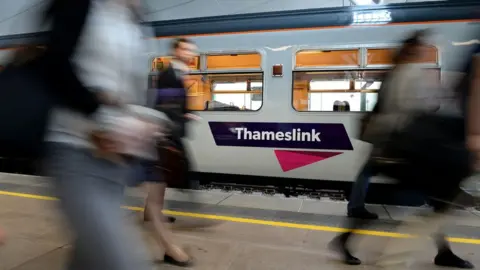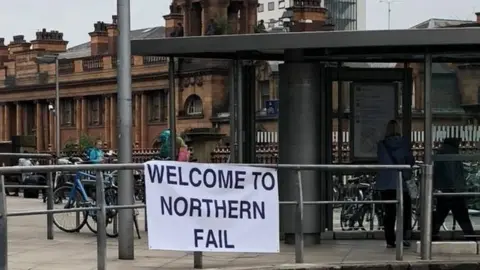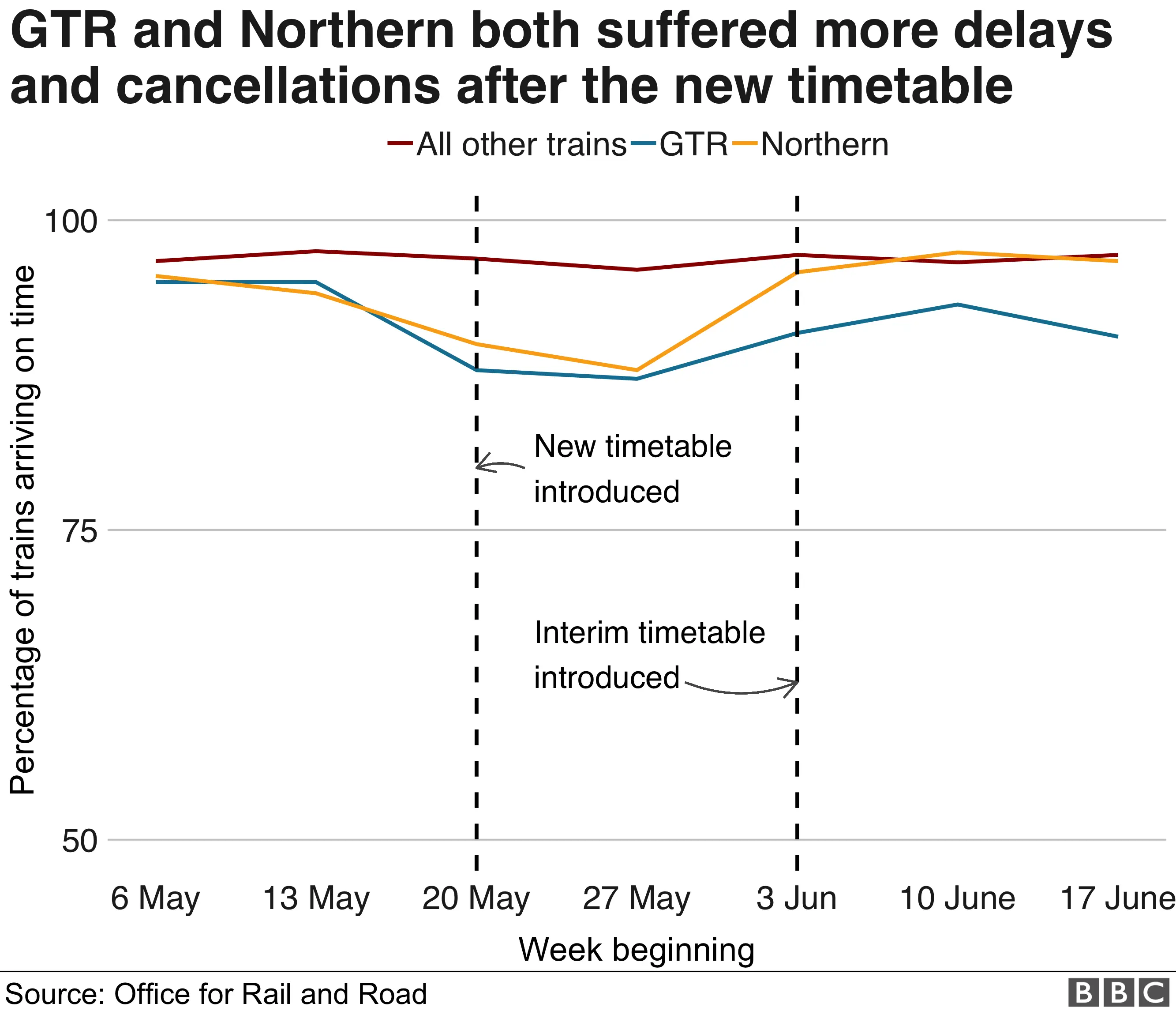Train delays: 'Lack of accountability' led to rail timetable chaos
"No-one took charge" during the timetable chaos that caused severe disruption on Britain's railways in May, a regulator has said.
The Office of Rail and Road (ORR) blamed a lack of "responsibility and accountability" and said passengers were "badly treated".
It said track manager Network Rail, two train operators and the Department for Transport "had all made mistakes".
It came as the government promised a major review of Britain's railways.
Transport Secretary Chris Grayling - who had previously insisted: "I don't run the railways" - told the BBC's Today programme that the problem was system-wide and that it was his job to "make sure it doesn't happen again".
He said he had taken at "face value" assurances by industry-leaders that they were ready to make the changes.
What happened?
From 20 May, passengers suffered delays and cancellations after the rail industry attempted to introduce the biggest timetable change in a generation.
The upgrade - which involved changes to 46% of train times - mainly affected Northern Trains in the north west of England and Govia Thameslink (GTR) routes into London.
 PA
PAOver a period of several weeks, GTR and Northern cancelled up to 470 and 310 scheduled trains respectively each weekday.
ORR chairman Prof Stephen Glaister said: "Good intentions and over-optimism within the rail industry about its ability to recover missed deadlines left no time to uncover and fix problems.
"When problems arose, timetable planners were stretched and train operators were ill-equipped to help passengers."
Who was to blame?
Prof Glaister told the BBC "it was unclear" who should have the responsibility for tackling the problems.
But, following a three-month inquiry, the ORR found the causes of the botched rollout dated back years.
These included delays with Network Rail's electrification work in northern England, as well as late changes to the Thameslink programme.
This pushed back the development of the timetable and gave train operators less time to prepare for the introduction of new services.
 Stephen Pimlott
Stephen PimlottThe ORR also said that:
- Network Rail was best placed to manage these risks but did not take sufficient action
- Neither GTR or Northern were prepared for the disruption that arose, nor did they do enough to provide accurate information to passengers
- Both the Department for Transport (DfT) and the ORR itself failed in their duties to oversee the industry
Prof Glaister told the BBC that the ORR itself had failings - like everyone else in the industry. "We took on trust what we were told," he said.
"What happened here is that railway people have a tradition of sorting out problems as they occur.
"That led to complacency when in the process of planning the timetables - deadlines were missed, late decisions were made so that operators didn't have time to deliver a proper service on the day."

Analysis:
Tom Burridge, Transport correspondent
This report underlines an inherent weakness in our rail system; No single entity or person is in overall control.
The mayhem resulting from a complicated shake-up of timetables on Northern and Govia Thameslink was the product of systemic failings over several months.
But as the problems built up on both Network Rail and Govia Thameslink in the run-up to the launch of the new schedules, it seems that no-one properly flagged up the risks and the potential that it all might go badly wrong.
Officials from Network Rail, the Department for Transport (DfT) and the train companies were meeting.
Industry sources say DfT officials were briefed that things weren't going to plan. The Transport Secretary Chris Grayling says he received the necessary assurances from the train companies.
So the infamous and well-known British train blame game rolls on.

What have the rail companies and government said?
Andrew Haines, the boss of Network Rail, offered his "sincerest apologies to passengers for letting them down with May's timetable troubles".
"A whole system approach to timetable planning must be the way ahead and we have already started on that path with the new winter timetable due in December that will see some modest improvements."
The DfT said it welcomed the ORR's findings and called May's disruption "unacceptable".
The resignation of Charles Horton, chief executive of GTR, was announced in June.

Mr Grayling, when asked if other resignations were needed, said the report found Northern Rail's problems were linked to local infrastructure problems.
Northern Rail said the report found "that the root cause of the timetable disruption was delays to engineering projects to improve the railway".
It said train operators were usually given 40 weeks to plan the twice-yearly introduction but had to rewrite its May 2018 timetable in 16 weeks.
The company added it was "deeply sorry" for the disruption, saying it had reinstated 151 of the 165 services hit by the problems.
Paul Plummer, chief executive of the Rail Delivery Group which represents train companies and Network Rail, said the rail industry was determined to learn from the issues to avoid a repeat.
He added: "The structural issues highlighted in this report underline the need for the wide-ranging, root and branch rail review we have been calling for to deliver meaningful reform."
What will the review contain?
The government has also launched what it called the most significant review of the rail industry since privatisation, headed by former British Airways boss Keith Williams.
It comes amid significant challenges, with punctuality at a 12-year low and commuters facing an increase of up to 3.2% in the cost of season tickets from January.
The DfT said the review would consider all parts of the sector, including accountability, the franchising system and value for money for passengers and taxpayers.
Mr Grayling told the BBC: "The fragmentation of the industry today doesn't work".
"What I am absolutely certain of is we need an integrated railway".
He pointed to Japan where the rail companies were integrated and London where contracts were performance-related.
Labour wants to nationalise the industry but Mr Grayling told the BBC: "It's not about ownership... it's about the pressure on the system."
